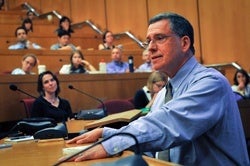July 26, 2012 — It’s a mistake to believe that the Supreme Court’s June 28, 2012 ruling on the Affordable Care Act ended the debate over health care, Harvard School of Public Health policy expert Robert Blendon recently told an audience at the School. He predicted that the upcoming presidential election will be the decisive moment for this still highly polarized issue.
“The election will set the course for health care policy, but the election will be decided based on issues other than health care,” Blendon said, observing that only a small fraction of voters care enough to base their decision on a candidate’s position on the matter.
While the Supreme Court’s decision to uphold most of the health care law often referred to as Obamacare was greeted positively on the left-leaning East and West coasts, many likely voters in other parts of the country find the law intrusive, said Blendon, senior associate dean for policy translation and professor of public health at HSPH, and director of the Harvard Opinion Research Program. Speaking to a packed audience in HSPH’s Snyder Auditorium on July 17 as part of the annual Hot Topics lecture series, Blendon explained that at the heart of the debate is a fundamental disagreement over the role of government in people’s lives.
According to recent polling analyzed by Blendon’s group, 77% of Republicans feel that government programs are a waste of money; 41% of Democrats think so. When asked whether the government is too involved in health care, 88% of Republicans said yes while only 37% of Democrats said yes. Feelings about the Affordable Care Act remain evenly split, Blendon said.
The health care law’s most hotly debated component, the so-called “individual mandate,” was upheld by the Supreme Court. The Justices ruled that it is constitutional for the federal government to require those who don’t purchase health insurance to pay a penalty, which Congress can impose using its power to tax. The Court also moved to limit the law’s Medicaid expansion provision; states that don’t expand their Medicaid rolls, as the ACA calls for, would not lose their existing Medicaid funding, but would forfeit new funds.
Presumptive Republican presidential nominee Mitt Romney has vowed to repeal the law if elected. If President Obama wins reelection but Republicans win control of the House of Representatives, parts of the law could lose funding.
Although voters list the economy as their top concern and health care a distant third, Blendon predicts that the health care law will continue to be the subject of heated rhetoric and negative campaign ads during this election season. Most Americans have already made their minds up about the law, but voter mobilization around the issue could still be a key factor in deciding the election, Blendon said. Eight out of ten likely voters already have health insurance, and many of them are worried about taxes and insurance premiums increasing in order to improve access for those without insurance. The individuals most likely to gain coverage through the Affordable Care Act, including young adults, are less likely to vote in high numbers, said Blendon.
While opinions about health care may seem intractable today, Blendon observed that 20 years ago he never would have believed that gay marriage would have gained so much acceptance. Opinions on social issues such as health care tend to change more quickly than those regarding whether the wealthy should pay higher taxes to help those in need, Blendon said.
“An important thing in politics in the United States is that if you ever hear a speaker say ‘never,’ leave the room,” Blendon said. “There’s no such thing as ‘never.’ It’s only in ‘the next two years’.”
—Amy Roeder
